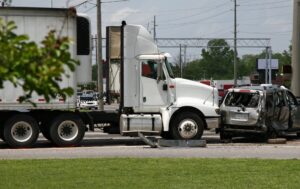 Getting into an 18-wheeler accident can completely change your life in an instant. The average 18-wheeler weighs around 12.5 tons, while the average car weighs around 1.4 tons – because of this, semi-truck accidents can be extremely dangerous. In a major hub city like Houston, traffic accidents are a common occurrence. According to the Texas Department of Transportation, one person dies every 2 hours and 7 minutes on Texas roadways.
Getting into an 18-wheeler accident can completely change your life in an instant. The average 18-wheeler weighs around 12.5 tons, while the average car weighs around 1.4 tons – because of this, semi-truck accidents can be extremely dangerous. In a major hub city like Houston, traffic accidents are a common occurrence. According to the Texas Department of Transportation, one person dies every 2 hours and 7 minutes on Texas roadways.
Along with the potential impact on your safety, proving your claim can be incredibly complex. Because of this, the first step toward protecting your future is contacting a trusted, experienced 18-wheeler accident attorney who can help you win your case. Understanding the importance of not only assembling a knowledgeable team but also learning how the process works for yourself is imperative for achieving the best results.
Decoding the Significance of Evidence in Your Semi-Truck Accident Claim
Evidence is crucial in any sort of case, but when proving one person at fault over another, it is invaluable for arguing your side of the story. Here at Maida Law Firm, we can use your evidence to fight for you – and if we don’t win, you don’t pay one cent.
Compared to standard car accident claims, 18-wheeler claims can be much more complicated to navigate. The process will include a deep dive into the vast assortment of details surrounding the accidents and drivers. Luckily for you, this process doesn’t have to be out of your control; collecting valuable evidence can begin on the scene and can greatly impact the outcome of your 18-wheeler accident claim.
Striking While the Iron is Hot: Collecting Evidence on the Scene
In many cases, collecting evidence on the scene can slip out of your mind during the initial panic and the stress-induced daze that follows. However, getting photo and video evidence of the scene is vital in winning your case. Be sure to photograph the damage done to both vehicles, including close-up and wide angles, to show the most accurate portrayal of the harm.
As well as capturing the vehicle damage, taking photographs and videos of the scene itself can help provide a full picture of how the accident occurred. If there are any skid marks on the road, or debris on the ground, or significant weather conditions present, they must be included.
Obtaining a Police Accident Log
This document is one of the most crucial aspects of a successful 18-wheeler accident claim. Not only does it include initial findings from on-site officers, sometimes it may also have more information about what factors might have contributed to the accident that can be used to build your case.
When you choose Maida Law Firm to help you fight for justice, we put in the work to obtain these official documents for you. This can help make a potentially stressful process a little easier for you or those affected by the accident.
Using Eye-Witness Accounts To Build Your Case
Seeking unbiased, third-party witnesses to help build your case is an important piece of evidence because it helps flush out the full story of the accident. Witness accounts might even include information that police reports or your photographs might have missed.
The best way to secure witness testimonies is to have a proactive approach. Actively seek out anyone who may have stopped on the scene or is clearly in the line of sight, and be sure to note their full name, as well as their contact information. If you or any witnesses have dashcam footage from the time of the accident, that can be highly useful for building your case through solid evidentiary support as well.
If you’re unable to locate an eyewitness at the immediate scene of the accident, consider returning to the scene later and asking nearby businesses or residents if they had any useful information they would be willing to share.
Behind the Wheel: Driver and Big Rig Company Specific Evidence
Because of the complex liability involved with trucking companies, your case might have more than one entity at fault. Maida Law Firm is experienced in diving deep into the truck driver’s records all all types of operational records from the trucking company itself. This evidence category is essential as it can help prove both negligence and liability.
Diving Deep into the 18-Wheeler Driver’s Records
We start by verifying their Commercial Driver’s License (CDL) information. We check the validity of the records to ensure we can document all training and documents needed for that license classification.
Along with their licensing information, we also closely inspect their hours log. Many semi-trucks are equipped with Electronic Logging Devices that automatically track how many hours are spent with the vehicle actively in motion. This is valuable because it can offer insight into potential driver fatigue claims if the driver was operating outside of allotted driving time.
Finally, it is also crucial to examine both the driver’s prior driving history and their drug and alcohol testing results. This can help paint an accurate picture of whether the driver has contributed to dangerous accidents in the past. If a driver has continuously been written up for straying from set driving hours or has been in major accidents in the past, this could point toward driver negligence and liability.
Uncovering Trucking Company Negligence in Your 18-Wheeler Accident
Aside from the driver’s actions, it’s common for 18-wheeler accidents to expose problems within the company operations. Our team at Maida Law Firm will conduct a detailed investigation into all significant company records that could show proof of negligence that can help win your case. Some key pieces of information for proving negligence could include:
- Maintenance and inspection records –These can include inspections that take place before and after the accident to provide a full-scope analysis. Additionally, it can include repair history and how the company approaches crucial preventative maintenance.
- Overall fleet safety records – Seeing what the company’s overall safety rating is can help our team understand their reputation and how much they value public safety.
- Insurance policies – We will investigate exactly what their policies look like and what their coverage limits include.
- Cargo details – This means what type of cargo was being transported by the semi-truck at the time of the accident. The weight and other unique factors regarding the truck’s contents can affect things like braking speed in some cases.
- Black Box data – Somewhat similar to an airplane’s data box, this equipment records all vehicle operation history up until the moment the accident occurred. This includes speed, braking, steering, and seat belt usage. This can be vital for building your 18-wheeler accident case.
Drive Your Case Home by Hiring an 18-Wheeler Accident Attorney
Navigating a successful 18-wheeler accident claim takes more than just strong evidence; it demands strong expertise and a background in the process. Trucking companies are notorious for fighting hard to minimize your compensation and displace blame, even in the case of life-changing accidents.
Let us fight for you – Maida Law Firm strives to help our clients win their cases and get the maximum compensation they deserve every time. Contact us today for a free case evaluation.
